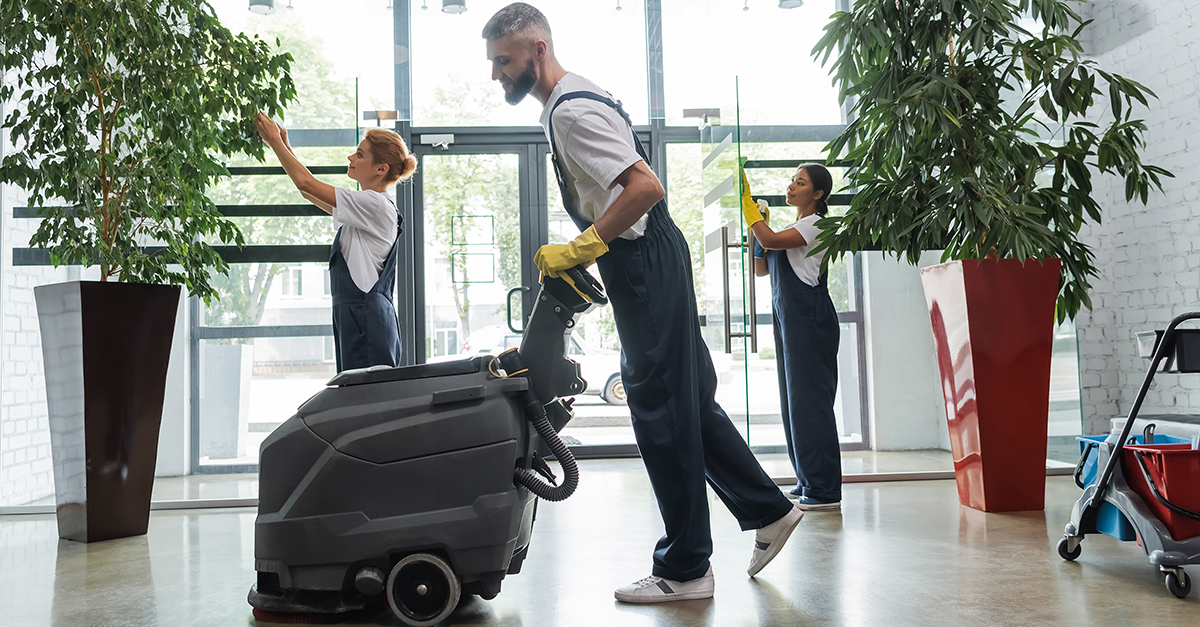Floorcare costs represent a significant percentage of commercial cleaning budgets. Although controlling those costs requires thoughtful purchasing, battery selection for your floorcare equipment isn’t always given the careful consideration it needs. Whether you want to eliminate battery maintenance, cut equipment downtime, decrease operator errors, or lower the total cost of ownership (TCO), understanding the pros and cons of your battery options can help you reduce costs and find the floorcare equipment solutions you seek.
Battery life depends on the battery type and how carefully you follow the manufacturer’s maintenance, charging, and operating guidelines. User errors cause many, if not most, problems with floorcare machine batteries.
Newer battery technologies let you avoid expensive maintenance and training as well as reduce downtime and user errors. Let’s look at the different technologies and their pros and cons.
Deep-cycle lithium-ion batteries
If you want outstanding longevity and performance, these maintenance-free batteries can be game changers for you. They feature an electronic battery management system (BMS) that monitors the batteries, gives them extraordinary capabilities, and cuts downtime.
The batteries last up to 10 years, fully charge in four hours, and generally discharge safely between 90–95%, giving them the most extended run times and lowest TCO of all the options. They also accept opportunity charging—the practice of charging a battery while it still has a partial charge—and maintain consistent power regardless of the state of charge.
Lithium-ion batteries have a low self-discharge rate that allows for long-term storage without frequent charging, and they weigh considerably less than other batteries. When used in small, walk-behind floorcare machines, they may require counterbalance.
These batteries are available in 24-, 36- and 48-volt models, with the 24-volt being the most popular. However, big, 36-volt floorcare machines with heavy usage can benefit from the higher voltage options.
On the downside, lithium-ion batteries carry a significantly higher price tag than other options and currently offer limited recyclability.
But they can be a good choice if you keep your equipment for five years or longer, use the battery for 10 or more years, require the most extended run times, and shop for equipment based on its TCO.
The best models meet stringent SAE standards for vibration resistance and deliver longer runtimes than others.
On the safety front, look for lithium-ion batteries with a stable lithium-ion-phosphate (LFP) formula and a smart BMS with builtin redundancies against short circuits and overheating.
Deep-cycle premium AGMs with carbon additives
Premium absorbent glass mat (AGM) batteries with carbon additives don’t offer the lifespan, rapid charging, and extended run times of lithium-ion batteries, but they strike a balance between standard AGM and lithium-ion. They overcome many of the limitations of standard AGM. Plus, they are maintenance free.
Based on trusted valve-regulated lead acid (VRLA) technology, premium AGM batteries deliver up to two to three times the cycle life of standard AGMs, work in a partial state of charge (PSoC), and accept opportunity charging without damage. This allows crews to grab quick charges during breaks or lunch, extends the workday, and reduces the likelihood of damaging operator errors—options not available to crews using standard AGMs.
PSoC operations and opportunity charging are especially important for facilities that clean multiple times daily. These facilities include grocery stores that clean at night or during early morning hours, but also spot clean throughout the day, as well as large warehouses that clean various areas at different times.
Premium AGM batteries have plug-and-play compatibility with standard AGM chargers and algorithms, and they’re 99% recyclable.
Several manufacturers make premium AGM batteries with carbon additives that prevent sulfation and preserve the negative active material. But to increase the return on your investment (ROI), look for models that also feature technology that helps prevent the degradation of the positive active material. This further extends battery life.
Top-of-the-line premium AGMs deliver up to three times the life cycle of standard AGMs and are validated at 2500 cycles at 100% depth of discharge (DoD). In comparison, most premium AGM batteries only double the cycle life of standard AGM.
For specific applications, such as cold storage areas, make sure the batteries deliver robust performance in extreme temperatures. The best premium AGMs operate in temperatures ranging from -40o F to 160o F (-40o C to 71o C).
Buy batteries tested to withstand long-term, repeated PSoC operations to ensure high performance.
Premium AGM batteries with carbon additives are a good option if you want a maintenance-free battery that withstands user abuse, you keep your equipment for three to five years and want to use the same batteries, or you operate in extreme climates and need opportunity charging.
Deep-cycle standard AGM
If you prefer a maintenance-free battery at a lower entry price, consider a standard AGM. The electrolyte in this battery is absorbed in fiberglass mats instead of being free-flowing, requiring no watering. This feature makes them more vibration resistant than flooded lead-acid batteries (which will be discussed in the next section). They also charge faster, can be stored and installed in any orientation, and can withstand cold temperatures.
However, standard AGM batteries are not designed for opportunity charging or PSoC operation, and they become damaged and even fail if these activities are done repeatedly.
Standard AGM batteries might be suitable for those who demand maintenance-free batteries at the lowest price point and use their equipment in cold to mild temperatures but not in extreme heat.
Deep-cycle flooded lead-acid
Flooded lead-acid batteries feature the lowest purchase price of all the options. If you follow the manufacturer’s guidelines regarding maintenance, charging, and watering, they deliver years of durability, reliability, and performance.
The main drawback to this technology is that, unlike the other batteries, they require regular maintenance and employee training. These requirements can be a problem given today’s high employee turnover combined with the need to assign maintenance responsibility and keep employees accountable.
These batteries must be fully recharged after each use. They are prone to corrosion, sulfation, and early battery failure if repeatedly used in PSoC or opportunity-charged mode.
Further, some applications don’t allow flooded lead-acid batteries to prevent the risk of acid spills that might damage floors or goods and create health hazards.
Despite their limitations, these batteries can be a good option for users who want basic technology and the lowest price point, who don’t mind performing battery maintenance, and don’t need opportunity charging.
Due-diligence purchasing
There is no “one size fits all” battery. While flooded lead-acids are the least expensive, they might not deliver the best ROI.
And even though standard AGM, premium AGM with carbon additives, and lithium-ion batteries are alike in that they are all maintenance-free, each provides its own unique benefits.
To determine the best battery for your application, consider any issues you currently face, your performance needs, and your budget. You can overcome problems, cut downtime, and increase ROI with thoughtful battery purchasing.



